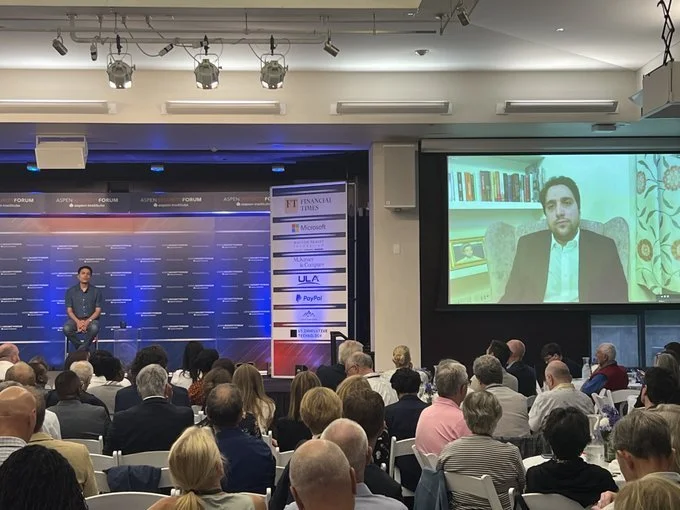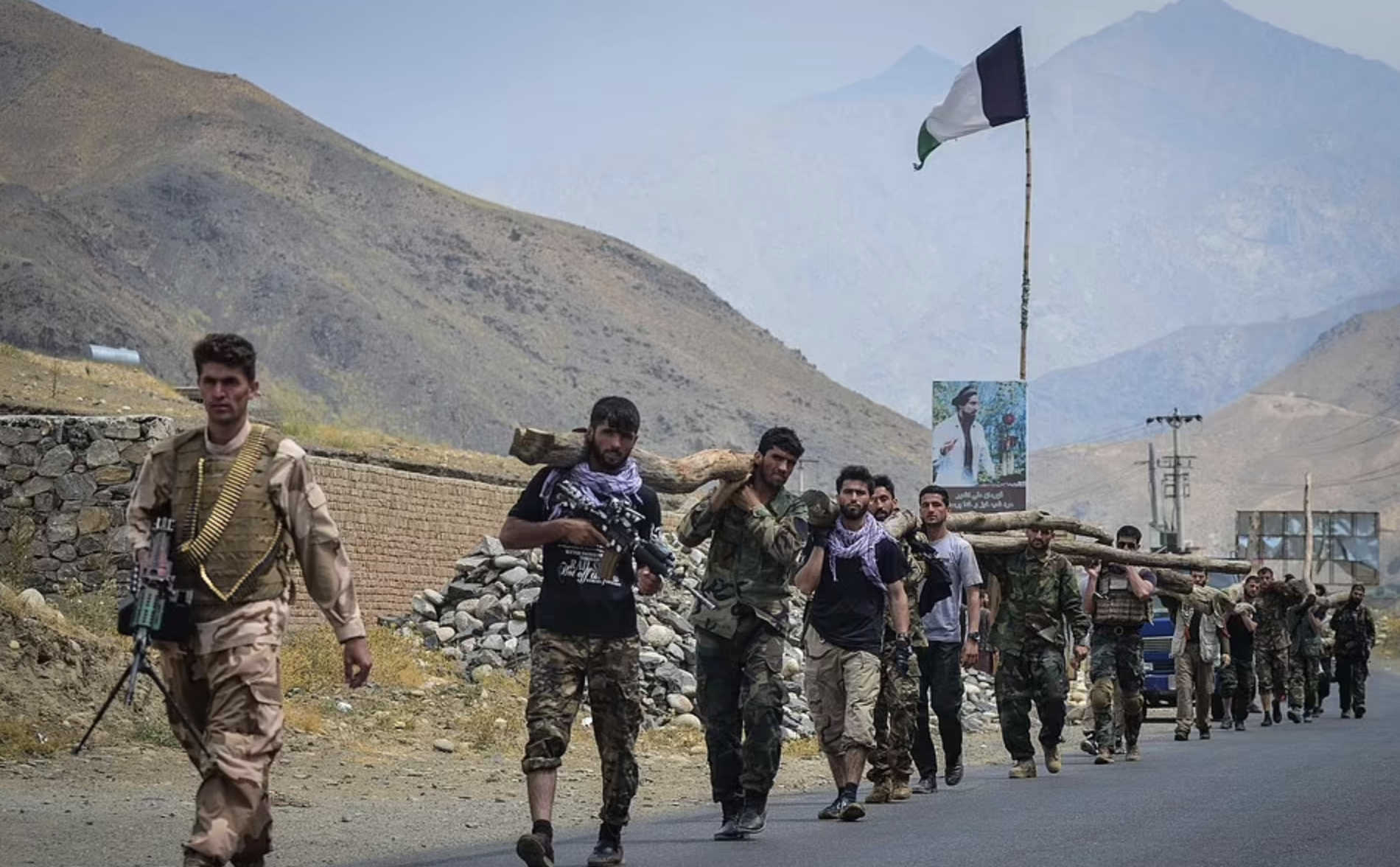Ahmad Massoud at the Aspen Security Forum 2023
A Stand for Freedom and the Voice of Afghanistan’s Resistance
July 20, 2023 - Ahmad Massoud, leader of the National Resistance Front of Afghanistan, stepped into the virtual global stage of the Aspen Security Forum 2023, where he spoke with CNN's Fareed Zakaria earnestly about the pressing issues facing Afghanistan under the Taliban terrorists regime today. Their interaction was billed as a “Fireside Chat,” and it shed light on the daunting challenges faced by the NRF and the people of Afghanistan.
The Aspen Security Forum, now in its 14th year, has become an essential venue for national and international leaders to discuss the most pressing security and foreign policy issues. The Forum, held annually in Aspen, Colorado, and Washington D.C., brings together an exclusive cohort of speakers and audience members, including government officials, military leaders, scholars, and business executives from around the globe.
This year, the forum aimed to address burgeoning technological, security, economic, and geopolitical risks that lie just “over the horizon,” fostering creative and collaborative solutions for these critical challenges.
Among a high-profile roster of speakers, including the likes of Condoleezza Rice, Joseph Nye, and Secretary Blinken, Ahmad Massoud's virtual appearance commanded significant attention. It was a critical opportunity to hear directly from the frontlines of the struggle for freedom and democracy in Afghanistan.
“Our effort in the struggle is a moral duty. The whole society of Afghanistan are trying to fight against the Taliban. It is a duty to fight for what we believe in, for our country, and for our freedom. We feel betrayed and alone but we have each other.”
In his heartening call to arms, Ahmad Massoud draws attention to a struggle that is not only political or military, but also fundamentally moral. His words reveal the resilience of a society under duress, tirelessly confronting the oppressive force of the Taliban, not as scattered individuals but as a united front. This shared fight speaks volumes about Afghanistan's unyielding resolve and collective courage.
Massoud's narrative brings to light the noble and deeply human struggle for freedom and dignity that underscores their resistance. Indeed, they may feel abandoned by the world, but in the shared commitment to their land and principles, they find a strength that bonds them together. This struggle is not just about reclaiming their country; it's about upholding the values that make them a nation—freedom, justice, and the human right to live in peace.
“The women are in a critical situation as we are speaking. The government is not governed by a constitution. It is ruled by a series of decrees which are becoming more religious-centric.”
These remarks unflinchingly confront the disturbing reality faced by women in Afghanistan today. Far from spiraling towards religious extremism, Afghanistan under the Taliban has alarmingly already plunged deep into it. The situation has devolved to the point where the Taliban’s despotic regime operates not under the rule of law, but instead through a series of oppressive, ethno-religious charged decrees.
Women's rights, once progressing, are now aggressively suppressed, with their freedoms and liberties being obliterated daily. Today’s Afghanistan is rightly being called a gender-apartheid regime, as a result of the widespread violation of women's fundamental and basic rights. This disastrous reality adds urgency to the mission of the National Resistance Front and its struggle to advocate for a democratic, free, and inclusive Afghanistan. The international community must unitedly acknowledge and respond to this pervasive humanitarian crisis.
“Let’s not forget that by the presence of NATO in Afghanistan, Afghanistan was not fighting only against the Taliban, but also international terrorism.”
Massoud's reflection on NATO's former role in Afghanistan is a critical reminder of the larger battle that had once been waged within the nation's borders. Beyond resisting the Taliban terrorists, Afghanistan was at the frontline in a broader global struggle against international terrorism. The earlier presence of NATO was an acknowledgment of this fact, symbolizing a collective defiance against extremism.
Although NATO forces have since withdrawn, the implications of their departure still resonate, extending well beyond Afghanistan's borders. Their departure signaled a call to action that only Massoud responded to with arms to resist.
So despite NATO's absence, the fight against terrorism continues, and it's a battle the world cannot afford to ignore. International terrorism remains a grave threat to global peace and security, and to counter it, a stable and peaceful Afghanistan is crucial.
Hence, the international community must step up and invest in supporting the National Resistance Front in their vital mission to restore peace and security in Afghanistan.
Holding a geographical area equivalent to France, a leading global power, underscores the unprecedented scale of influence these terror groups now wield. This presents not only a national crisis for Afghanistan but also a disturbing shift in the global balance of power. As these extremist groups continue to grow even more in strength and geographic control, their capacity to threaten global peace and security magnifies. This comparison illustrates the vast expanse of their influence and the immense challenges that lie ahead. The world has never before had to face a scenario where such extensive territory is under the control of a multitude of terror groups. In a globally interconnected era, such an issue cannot be overlooked. Again, these realities serve as a rallying call for international unity and decisive action to support the National Resistance Front of Afghanistan.
“Both the Afghanistan government and the Americans are at fault for the current situation we are at. Not just the negotiation was at fault but the whole process from talking to Taliban to withdrawing, all of it was catastrophic.”
Pulling no punches in his critique, Massoud implicates both the past Afghanistan government and the U.S. in precipitating the current crisis. This grave situation, as he succinctly puts it, is the outcome of not one, but a series of disastrous decisions. The initiation of negotiations with the Taliban, followed by a hasty and poorly managed withdrawal, formed a calamitous series of events, leaving a power vacuum that the Taliban terrorists were ready to exploit. Massoud's words reveal an inconvenient reality: the crisis we see today in Afghanistan isn't confined to the nation; it is the fruit of international missteps.
Disappointingly, the impassioned pleas of Ahmad Massoud and the urgent needs of the National Resistance Front have yet to elicit the necessary degree of global support. This struggle, a desperate battle for democracy, peace, and freedom in Afghanistan, is pushed to the precipice due to lackluster international backing in their resistance against the brutal reign of the Taliban.
The observations shared by Ahmad Massoud at the Aspen Security Forum have underscored the necessity of fostering international unity in support of the National Resistance Front. The future of Afghanistan—peaceful, free, and unshackled—rests on the shoulders of the tireless NRF. However, they can't shoulder this burden alone. A spectator role won't suffice for the global community. What's needed is robust engagement, decisive commitment, and tangible action to turn the tides in favor of the brave men and women risking their lives to restore dignity and freedom to their nation.


